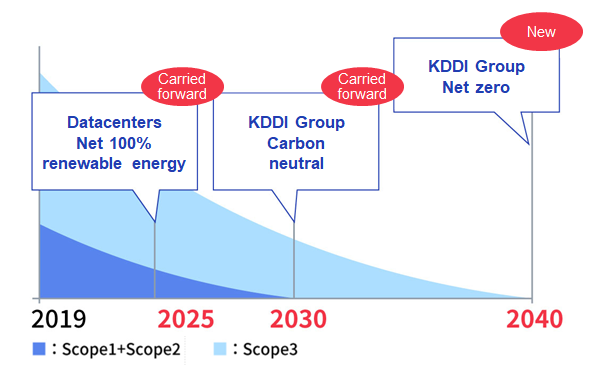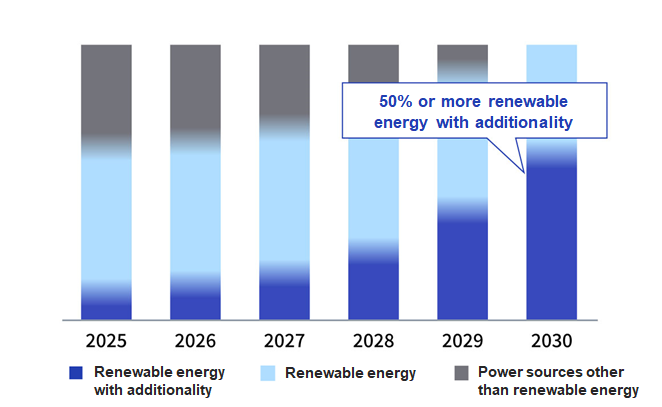- KDDI HOME
 Corporate Information
Corporate Information  Sustainability
Sustainability  Environment
Environment  Decarbonized society
Decarbonized society
Decarbonized society
KDDI's Approach (Decarbonized society, Carbon neutral, net zero)
The KDDI Group recognizes that it is an important responsibility as a global company to promote global environmental protection so that we can pass on our irreplaceable earth to the next generation, and we will continue our efforts to ensure a prosperous planet for the future.
The KDDI Group aims to achieve carbon neutrality CO2 emissions for Scope 1 and 2 [1] of the entire KDDI Group by fiscal 2030 and net zero [2] including Scope 3 by fiscal 2040.
The roadmap for achieving new targets


| Scope 1KDDI Group Approximately 2% of its CO2 emissions |
Details | In-house power generation at communication facilities, fuel consumption by cable-laying vessels, thermal power generation | |
|---|---|---|---|
| Methods | Offsetting being planned by quality-guaranteed carbon credits (absorbing and removing types (carbon-absorbing and removal origin)) | ||
| Scope 2KDDI Group Approximately 98% of its CO2 emissions |
Details | Electricity comprises approximately 99% of the energy used by communication facilities (of which stations, and station buildings and datacenters account for 50% each), and approximately 1% is from heat and steam | |
| Methods | Power |
All Telehouse-brand datacenters around the world will aim to switch to net-100% renewable energy by the end of fiscal 2025, by the means above [4]. |
|
| Heat and steam | Offsetting being planned by switching to electricity and turning to quality-guaranteeing certificates and carbon credits (absorbing and removing types (carbon-absorbing and removal origin)) | ||
| Scope 3 | Details | Approximately 95% falls into Category 1 (purchase of services and products) and Category 2 (capital goods) | |
| Methods | Request and support initiatives aimed at visualizing and reducing CO2 emissions for business partners (sharing knowledge on CO2 emission reduction through dialogues, providing guidebooks, and similar methods) | ||
- [1]We plan to reduce over 97% of Scope 1 + 2 emissions, with the remaining approximately 3% offset by quality-assured carbon credits and other means.
- [2]In accordance with the "Net Zero Standard for Corporations" published by the SBTi (Science Based Targets initiative, an international climate change initiative), KDDI aims to achieve a substantial reduction in CO2 emissions from its business activities, including emissions from Scope 1 and Scope 2, as well as Scope 3 emissions across the entire supply chain to net zero. This involves reducing Scope 1 + 2 emissions by over 97% and Scope 3 emissions by over 90% (as an intermediate target for Scope 3, a 28% reduction compared to 2019 levels by the fiscal year 2030).
Any remaining emissions (less than 3% for Scope 1 + 2 and less than 10% for Scope 3) will be offset using quality-assured carbon credits and other methods. - [3]Abbreviations
- PPA: Power Purchase Agreement. A system where PPC business operators build solar power generation facilities on idle land and the like owned by parties needing electricity, providing renewable energy
- RE100: Renewable Energy 100%. An international initiative aimed at procuring energy used in business activities completely from renewable energy sources
- FIT: Feed-in-tariff system. A system that mandates electricity companies to purchase the electricity produced by solar power and wind power facilities at the prices specified by the state
- I-REC: International Renewable Energy Certificate. One of the renewable energy certificates overseas
- [4]Targets at datacenters
- The Telehouse datacenters covered by these targets refer to the datacenters whose buildings and facilities are owned by the KDDI Group. Excluded are the types where the KDDI Group borrows part of other companies' datacenters as facilities to provide services.
- These targets do not include communication station buildings for company businesses, resale of other companies' services, and datacenters not included in consolidated financial statements. Communication station buildings for company businesses aim to achieve carbon neutrality CO2 emissions by fiscal 2030 (Scopes 1 + 2.)
- Under Scope 2, the plan is to switch to using 100% of electricity from renewable sources by fiscal 2025, and for heat and steam sources to achieve carbon neutrality CO2 emissions by fiscal 2030 together with Scope 1.
- Telehouse customers who procure their own environmental values may be excluded from the coverage.
- Datacenters that are scheduled for closure are not covered by these targets.
CO2 Emissions
| Item | Boundary | Coverage (FY2022) |
FY2018 | FY2019 | FY2020 | FY2021 | FY2022 | ||||||
|---|---|---|---|---|---|---|---|---|---|---|---|---|---|
| Third-party guarantee for Scope 1 emissions and Scope 2 emissions | - | ◯ | ◯ | ◯ | ◯ | Planning to obtain in March 2024 | |||||||
| Third-party verification of Scope 3 emissions | - | ◯ | ◯ | ◯ | ◯ | ◯ | |||||||
| CO2 Emissions | - | t | % | t | % | t | % | t | % | t | % | ||
| Scope 1 [4] | All direct GHG emissions | KDDI | - | 6,539 | 0.12 | 6,581 | 0.10 | 5,746 | 0.09 | 7,976 ✔ | 0.13 | 5,747 | 0.09 |
| Group | 100% | 25,511 | - | 25,169 | - | 25,420 | - | 27,687 ✔ | - | 88,383 | - | ||
| Scope 2 [5] (market-based) |
Indirect GHG emissions from consumption of purchased electricity, heat or steam | KDDI | - | 1,058,143 | 18.98 | 1,041,559 | 16.13 | 1,049,105 | 16.28 | 1,090,954 ✔ | 17.71 | 944,876 | 15.23 |
| Group | 100% | 1,369,942 | - | 1,352,131 | - | 1,296,381 | - | 1,492,048 ✔ | - | 1,318,013 | - | ||
| Scope 2 [5] (location-based) |
Group | 100% | 1,486,429 | - | 1,486,924 | - | 1,475,724 | - | 1,614,118 ✔ | - | 1,475,170 | - | |
| Total of Scope 1 + 2 emissions (market-based) |
KDDI | - | 1,064,683 | - | 1,048,140 | - | 1,054,850 | - | 1,098,929 ✔ | - | 950,622 | - | |
| Group | 100% | 1,395,453 | - | 1,377,300 | - | 1,321,801 | - | 1,519,735 ✔ | - | 1,406,396 | - | ||
- [4]Heavy oil (crude oil), diesel, kerosene, town gas
- [5]The CO2 emissions for power consumption are calculated using the emission factors furnished by electric utility operators. (Emissions from heat, steam, and hot and chilled water consumption are included.)
- Recent data with third-party guarantees ✔.
- The coverage is calculated based on operating revenue.
Renewable Energy Business
We launched solar power generation business in November 2013 with the aim of contributing to reduction of CO2 emissions. We constructed solar power generation facilities on part of company-owned land in seven facilities of four locations around Japan and sell the power to electric power companies based on the Feed-in Tariff Scheme for Renewable Energy.
| FY2017 | FY2018 | FY2019 | FY2020 | FY2021 | FY2022 | |
|---|---|---|---|---|---|---|
| Total generated energy (sold) | 18,137 | 17,998 | 17,406 | 17,566 | 17,664 | 16,649 |
Since September 1, 2021, in "au Denki" electricity supply service, KDDI has offered the "eco Plan." The practical renewable energy rate of this electricity supply plan is 100%, contributing to reduce CO2 emission from the society. The rate of renewable energy of our procured electricity has achieved 100% by supplying electricity together with non-fossil fuel energy certificates that have environmental value of not emitting CO2, such as solar and wind power. The plan has introduced a system that 2% of electricity charges will be donated to conservation efforts for the global environment, which allows KDDI to work together with customers to contribute to realize decarbonized society. The subsidiary, ENERES Co., Ltd. offers eco-friendly services, such as "RE100 Menu" that supplies electricity generated only from renewable energy sources that meets the RE100 criteria and "Non-Carbon Menu" that supplies electricity without any adjusted emission coefficients, and thus has contributed to customers' initiatives to mitigate global warming through its business.
Green Supported by ICTs
Reducing Power Consumption and Undertaking Disaster Measure Initiatives at Base Stations

The Environmental Eco Label is granted to KDDI ICT services that contribute to reducing the environmental impact of customers and society (reducing CO2 emissions).
| Environmental Eco Label services | Content |
|---|---|
| KDDI Cloud Platform Service | KDDI operates and maintains this platform, enabling customers to increase or decrease their server capacity remotely from their own offices, without having to travel to the data center where the servers are located. Furthermore, customers can reduce the amount of CO2 emissions they are responsible for by transferring the servers that they install, operate and maintain themselves (on-premises environment) to the KDDI Cloud Platform Service. With this service, server operations are performed with an economy of scale unique to a telecommunications operator, enabling an approximately 38% reduction in CO2 emissions per server per year in comparison to when customers operate their servers themselves. |
| Telehouse Data Center Services | These data centers have high power supply capacity, highly efficient and reliable power generation equipment, energy-efficient air conditioning equipment, LED lighting, outdoor lights that use wind and solar power and other advanced, energy-efficient equipment. |
| KDDI IoT Communication Service LPWA | This telecommunications service uses LPWA technology, which utilizes KDDI's 4G LTE network. This technology reduces the power consumed by telecommunication devices and provides telecommunications coverage over a wider area. |
| au Denki RE100 Menu and Non-Carbon Menu | Under the RE100 Menu, we supply electricity that meets RE100 criteria by supplying electricity derived from renewable energy sources (including electricity under Feed-in Tariff scheme) and offsetting carbon through the purchase of J-Credit (derived from renewable energy). Under the Non-Carbon Menu, we supply electricity with zero CO2 emissions derived from the electricity purchase by utilizing J-credit scheme. |
KDDI's Approach
KDDI has setted targets for risk reduction and the creation of business opportunities through its business activities under the "KDDI GREEN PLAN" with the aim of achieving a "decarbonized society. To achieve these goals, the KDDI Group promotes activities, participates in initiatives, and joins organizations.
- Recommended Contents
-


